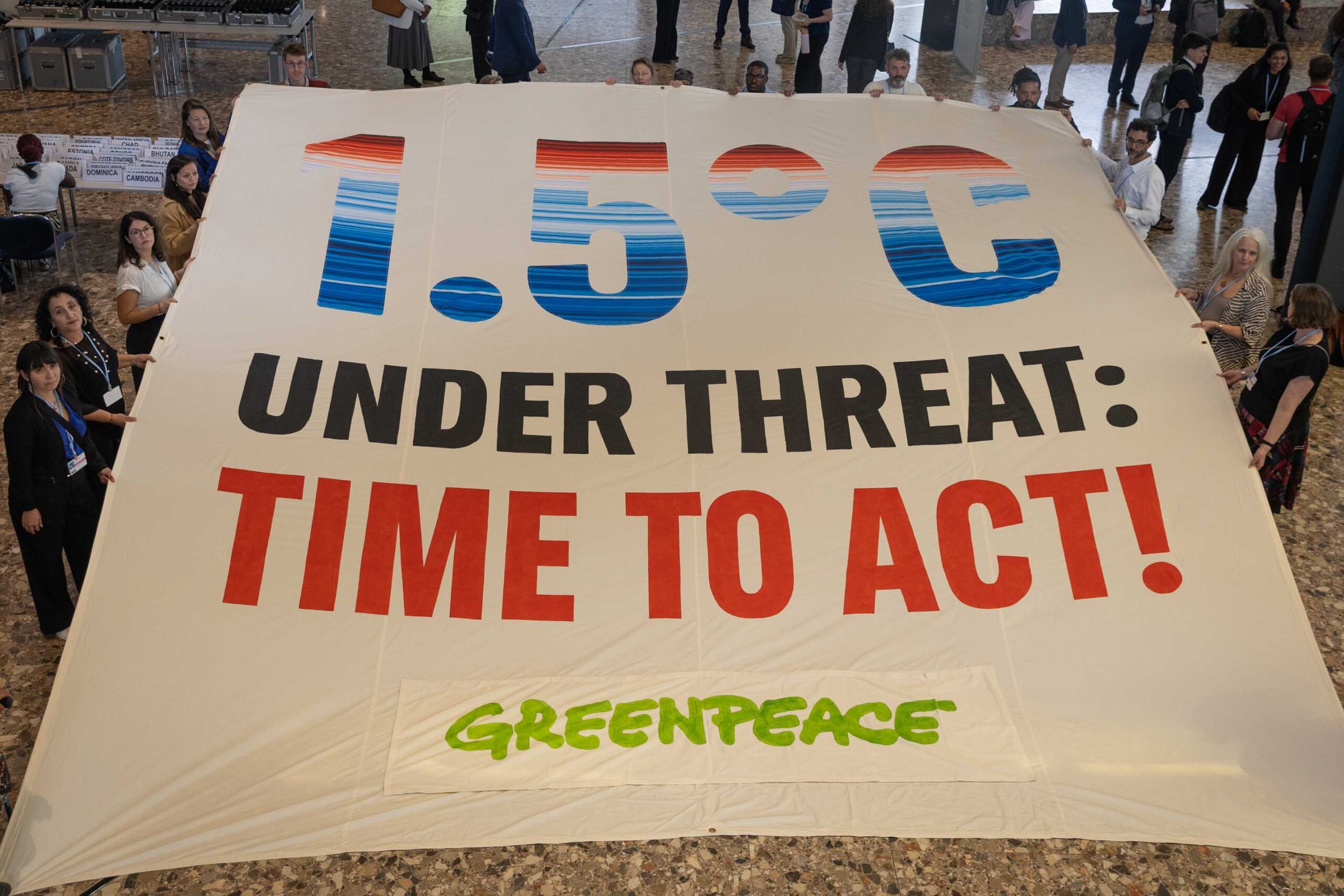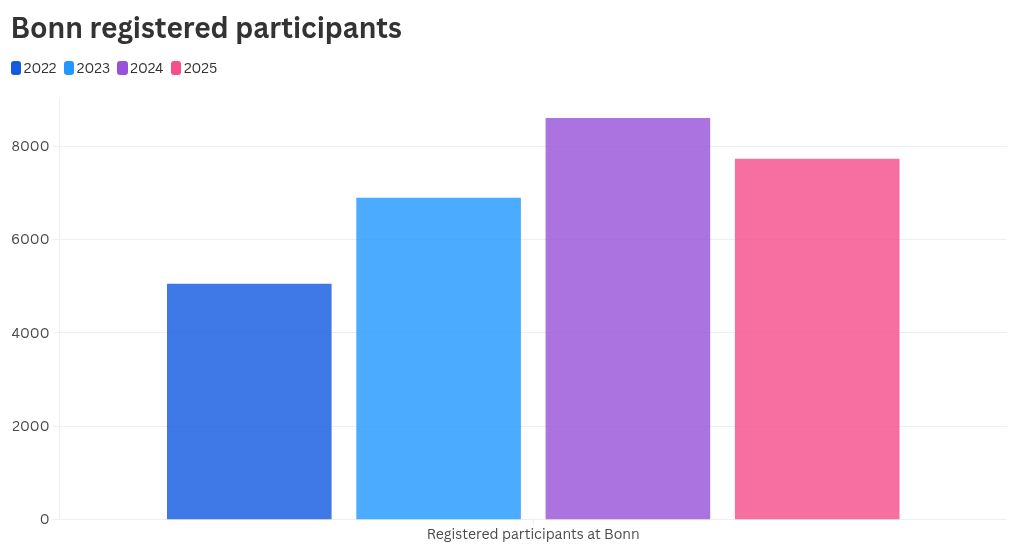Bonn agenda finally adopted after tough fight
Anyone would think there’s no climate emergency. The mid-year UN climate talks in Bonn were meant to open on Monday morning, to advance negotiations on the road to COP30 in Brazil on issues such as how to measure adaptation, transitioning away from fossil fuels and climate finance. More than a day and a half later, they finally started for real.
A delayed opening plenary was abandoned on Monday night as countries rowed over the agenda. After much wrangling behind closed doors, it was restarted and ended early Tuesday evening with the adoption of items to be negotiated, to polite applause and a bigger sense of discontent than satisfaction, especially among developing countries.
The most contentious issue was developing countries’ request to include two agenda items on the implementation of Article 9.1 of the Paris Agreement – on finance provided by rich nations – and on climate change-related unilateral trade measures.
The European Union (EU) expressed its opposition from the beginning and later attempted to bring Articles 9.2 and 9.3 to the table, which refer to the possibility of other sources of finance, including voluntary contributions from other countries – always a red flag for China.
Developing countries appeared united in their requests for negotiations on climate finance and trade on the first two days of the Bonn talks. The results? They managed to get those issues into the work plan for the next eight days, but not quite as they had hoped.
On Article 9.1, the chairs of the talks at Bonn will hold “substantive consultations” and report back on their outcomes at COP30 in Belem.
And regarding the unilateral trade measures – code for carbon taxes on imports to the EU and some other developed countries – a footnote was added to the agenda saying the topic would be discussed under under relevant agenda items, including the Just Transition Work Programme.
“The past 30 hours have been hard and have not reflected the urgency that we face,” the UN climate chief Simon Stiell told the subdued end of the session.
The aftershocks of the bitter exchanges between countries rippled through the plenary hall as delegates took to the floor after the agenda was adopted.
Speaking on behalf of the Like-Minded Group of Developing Countries (LMDC) – which had initially put forward the contentious agenda items – Bolivia’s Diego Pacheco blamed the delay on developed countries, accusing them of refusing to discuss “issues that impact developing countries” while shifting their financial responsibilities to the private sector. “This is unacceptable,” he added.
Echoing Pacheco’s words, India’s negotiator said he was “extremely disappointed” with rich countries’ “reluctance” to talk about their “financial obligations”.
“It is hard to remain silent when our positions and motivations are mischaracterised by our partners,” hit back a representative of the EU, which had most fiercely resisted the inclusion of the agenda items (some said in the absence of the US at the talks). “When we don’t agree, we work together to reach compromises that allow us to move forward,” he added.
With the agenda finally sorted, negotiators can now turn their full attention to equally thorny discussions on things like the transition away from fossil fuels and indicators to help countries adapt to a warming world.
“We need to demonstrate to the world that climate cooperation can deliver,” Stiell pleaded with delegates, “now more than ever”.

UN climate body’s work balloons – but not its funding
For that desperately needed climate action to be stepped up, Stiell warned in his planned welcome speech – not delivered but only posted on the UNFCCC website due to the delayed opening – that “the acceleration still needed will only be possible if our process is adequately resourced”.
He said in the written comments that governments had given the UNFCCC more work to do but not more money to do it with. The body has been cutting costs, he said, “but this approach is not sustainable”.
The UNFCCC has released a document showing which parts of its work are under-funded. Particularly cash-strapped activities include communications campaigns promoting the UNFCCC process’s achievements, facilitating civil society participation in the process and enhancing the capacity of young negotiators.
A note from Stiell says that funding constraints “hindered efforts to modernise digital platforms and conferencing systems, including cybersecurity infrastructure; and adversely affected the timely processing of applications for UNFCCC observer status and the implementation of the gender and [Action for Climate Empowerment] workstreams”
Another document shows how much things cost. About three-quarters of the UNFCCC’s costs are salaries and these are set under a UN-wide system – so hard to get down.
Smaller costs like a five-day workshop with 100 people can cost €0.68m euros ($0.79m) to put on while a five-day official trip costs €3,700 per person ($4,284).
The tight budget situation has also led to “significantly reduced interpretation services” at the Bonn talks, with negotiators told they would not have them available at Tuesday’s delayed plenary and would need to speak in English.
Brazil’s ‘act of sabotage’ on oil
As the Brazilian COP30 Presidency attempts to take forward discussions at UN climate talks on the transition away from fossil fuels, their government colleagues back home today auctioned off the rights to extract oil and gas in 172 areas of Brazil and its waters – 47 of them offshore near the mouth of the Amazon River.
In Rio de Janeiro, the auction unfolded live on camera. The national anthem was played and a room of men in suits from around the world sat down to begin the bidding. An introductory video showed a plant being watered with bare hands while a caption advertised incentives to reduce the greenhouse gases from oil production.
Patricia Baran, head of the national oil agency ANP, told the cameras that other countries are still announcing new oil and gas fields too and that the blocks auctioned off will include additional environmental and social protections.
The bidding started with the controversial Amazon blocks – and Brazil’s national oil company Petrobras, American firms ExxonMobil and Chevron, and China’s state-owned CNPC were the winners of those.
Brazilian climate campaigners in Bonn expressed sympathy with the COP30 Presidency – whose CEO Ana Toni spent decades in environmental NGOs like Greenpeace and Action Aid.


Stela Herschmann, a climate specialist at Observatório do Clima, told a press conference that the auction was “an act of sabotage” against the climate and against “the Brazilian diplomats that are here and doing their best in Bonn to rally the world towards an ambitious COP in November”.
A press statement from 350.org picked out two saboteurs: the president of national oil company Petrobras, Magda Chambriard, who last month copied Donald Trump’s “drill baby drill” slogan, and Brazil’s mines and energy minister, Alexandre Silveira, who has said Brazil “should not be ashamed of being oil producers”.
ClimaInfo research estimates that, when burned, the oil and gas from the blocks being auctioned off would release 11 billion tonnes of carbon dioxide. Observatório do Clima’s Claudio Angelo told Climate Home today that an oil spill from the 47 offshore blocks near Belém and the Amazon River would devastate coral reefs, mangroves and the coastlines of both Brazil and neighbouring French Guiana.
The Amazon region now holds nearly one-fifth of the world’s recently discovered oil and natural gas reserves, establishing itself as a new global frontier for the fossil fuel industry, a recent investigation by Climate Home’s partner InfoAmazonia found.
All this comes on the same day that the International Energy Agency released its oil report for 2025, suggesting that growth in oil supply will be twice as fast as growth in oil demand during the rest of the decade. The IEA’s head Fatih Birol said “oil markets look set to be well-supplied”.
Angelo said this means there’s a risk that Brazil will make a loss on these oil and gas fields, especially if the world limits fossil fuel use to curb global warming.
Bonn or London – where’s the action at?
On the ground in Bonn, it feels like much of the climate energy is slipping away from the UNFCCC process. Just 7,731 people have registered to participate, a 10% drop on last year – and there definitely seem to be fewer journalists.
Many of the COP30 Presidency’s big-hitters will be skipping some or all of Bonn’s second week to go to London Climate Action Week, where they will be joined by Stiell’s boss – the head of the UN, Antonio Guterres. He will give a special address at E3G’s State of Climate Politics Forum next Tuesday.
One of Stiell’s predecessors, Christiana Figueres, wrote recently that the “potential for impact” is shifting from climate diplomacy to climate economics “and that shift is being staged not so much within COP venues, but at Climate Weeks in New York, London, and other cities around the world.” (London may eclipse NYC in importance this year, some are saying, as Trump’s policies threaten to scare the green crowd away.)
Nonetheless, Stiell asserted in his undelivered opening speech for the Bonn talks, “this process matters, deeply”, adding that it is “delivering real progress”.
He noted that “without UN-convened climate multilateralism”, the world would be headed for up to 5C of global warming, which has been cut to around 3C, adding: “it’s a measure of how far we’ve come, and how far to go.”
“These sessions are where we move from concept to clarity – across sectors, systems, and societies. You are laying down the tracks that further deliver implementation,” he said in words that were never heard by negotiators.


